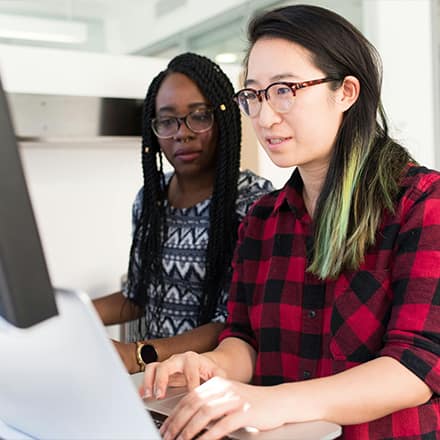Geosciences Instructor Dr. Jonathan Davis: A Faculty Q&A

Please tell us a bit about your professional background.
As a master's student, I worked as a virtual e-intern for the U.S. Department of State’s Office of the Historian and for the Peace Corps. For the Office of the Historian, I created a geospatial database of diplomatic initiatives from 1777 to present day. For the Peace Corps, I assisted in creating maps from satellite imagery for data-scarce areas after a natural disaster. I also worked as a digital storyteller at the Mapstory project. I created interactive maps that visualized history in its spatiotemporal context. My digital stories have been featured in The Washington Post and Business Insider, and have been recognized by Pew Research Center’s Chart of the Week in 2014.
Professionally, I have worked as a GIS (Geographic Information Systems) analyst for more than seven years.
What first drew you to higher education?
I have always enjoyed the learning process and becoming an instructor seemed like the logical next step to continue. I enjoy collaborative research and learning, and working with students as an instructor is a great way to do both.
What aspects of your own education have been particularly influential in shaping your professional life in academia?
The turning point in my academic career was pursuing a master’s in GIS. GIS is a skillset that was just as useful professionally as it was in conducting academic research. I have been able to publish in some of the top journals in my field and have a successful professional career.
How do you continue to learn and evolve as a leader in higher education?
I consistently seek best-in-practice research for pedagogy. Staying current in the field helps me be the best instructor I can be for my students and gives me the opportunity to try new things in the classroom.
I have published an article in active-learning best practices, and I am currently writing a pedagogy paper that explores gamification as an active/experiential learning approach in asynchronous online learning.
What do you feel is unique about the faculty, students and programs you oversee?
The students that I have in my geosciences courses are very ambitious and truly want to make a difference in the world. Many of them have families and full-time work, and are very passionate about environmental science, conservation, space exploration, climate change mitigation, sustainability and resiliency among other topics.
Can you think of a particularly impactful or eye-opening moment as a faculty member?
It was amazing to see how resilient the students were during the pandemic. So many persevered through great adversity, including significant mental and physical challenges. It would have been very easy for so many students to give up, particularly in a research-intensive capstone course, yet they persevered.
How have you found ways to effectively connect with students?
I try to create videos for my online courses to put a face to the name that is providing feedback on their work.
What advice do you have for new and current students?
I recommend trying to get experience in the area that you want to work in while you are going to school. It is great to build both academic credentials and professional experience at the same time. If you try something out while you are getting your degree and don’t like the job, you still have time to change your degree.
What it comes to the future of education, particularly for programs in geoscience, what’s on your mind?
Geoscience encompasses the study of the Earth and its processes. There is so much to explore in this field and the students who are in this degree have such wide interests related to geosciences. This is one of the critical STEM fields that will help mitigate extreme weather events and create a more sustainable and resilient future for us to reside.
As a geoscience major, you have many opportunities and career paths to make both significant intellectual contributions in understanding how our world works and really make a difference for our future.
Why is education important to you and the world at large?
I firmly believe that education — and particularly postsecondary education — provides one of the greatest opportunities for economic and social mobility for both domestic and foreign students. Thus, instructors are responsible for imparting academic content that is of value: content that helps students grow in knowledge and increases their opportunities to provide for themselves and their families.
This knowledge should also empower them to explore visionary new applications of their knowledge, catalyzing generational change and generating widespread impact on their communities.
Beyond work, what’s something you’re passionate about or really enjoy doing?
Currently I have two passions outside of time with my family and my career and that is maintaining a backyard orchard and disc golf.
A degree can change your life. Choose your program from 200+ SNHU degrees that can take you where you want to go.
Explore more content like this article

Types of IT Jobs

What is Hour of Code? A Chance to Kickstart Your Coding Literacy

SNHU Spotlight: Adaecus Brooks, BA in Graphic Design and Media Arts Grad
About Southern New Hampshire University

SNHU is a nonprofit, accredited university with a mission to make high-quality education more accessible and affordable for everyone.
Founded in 1932, and online since 1995, we’ve helped countless students reach their goals with flexible, career-focused programs. Our 300-acre campus in Manchester, NH is home to over 3,000 students, and we serve over 135,000 students online. Visit our about SNHU page to learn more about our mission, accreditations, leadership team, national recognitions and awards.

